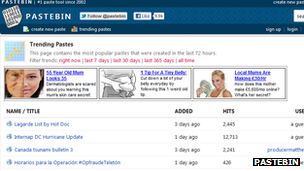Pastebin puts Anonymous spat behind it
- Published

Many of Pastebin's most read posts are created by or related to Anonymous despite earlier tension
Pastebin - a site where users can post text-based files for others to see - appears to have put a backlash from users behind it.
It had proved popular with Anonymous hacktivists, but many turned against it when its owner said he was considering removing "sensitive information".
The hackers even created a rival service.
Despite this, Pastebin said it had managed to achieve a new "milestone" of 25 million active "pastes".
"All those pastes together contain more than 1250 gigabytes of raw data," owner Jeroen Vader told the BBC.
"The last two years have been extremely hard work, but it seems to be paying off.
"On 27 October 2011 we reached the 10 million active pastes milestone; less than a year later on 4 July 2012 that doubled to 20 million, and now just over three months later we are celebrating 25 million pastes."
Anonymous anger
Pastebin became a popular tool for Anonymous since it allows posts by unnamed users to run up to 0.5 megabytes in size.
Members of the collective would often post a short Twitter message after a successful hack attack, providing a link to a Pastebin post which in turn contained details of the data they had copied from the target's computer servers.
These sometimes contained names, telephone numbers and addresses of people related to the organisations they had attacked.
As a consequence Mr Vader told the BBC earlier this year: "I am looking to hire some extra people soon to monitor more of the website's content, not just the items that are reported. Hopefully this will increase the speed in which we can remove sensitive information."
The news prompted some members of Anonymous to issue a press release, saying, external: "Pastebin has been in the news lately for making some rather shady claims as to what they are willing to censor, and when they are willing to give up IP addresses to the authorities."
It said a sub-group calling itself the Peoples Liberation Front [sic] had set up an alternative service called AnonPaste.
However, Pastebin's search tool and Trending Pastes feature - which the new site lacked - appear to have helped it overcome the backlash.
Among its most popular current pastes are:
A user identifying themselves with Anonymous highlighting an operation dubbed OpFraudeTeleton planned for December.
Another Anonymous post flagging Operation You've Been Owned, which aims to publicise a US court case that might make it illegal to sell copyrighted goods.
A post by Nullcrew - a group thought to be sympathetic to, but separate from, Anonymous - revealing details taken from a hack attack on Ford Motors.
One security consultant said it was no surprise that Pastebin had emerged unscathed.
"For all the big words people are still able to have anonymous accounts on Pastebin so they are effectively untraceable," said Prof Alan Woodward, a visiting professor at the University of Surrey's computing department.
"Everyone knows where Pastebin is and it has a reputation for being where such things are lodged - so it's simply where everyone goes to have a look."
Abuse team
Pastebin confirmed that action was being taken to take down the most sensitive information, and to warn concerned parties if their details had been revealed.
"Pastebin now has an abuse report team that deals with abuse reports much quicker than before," said Mr Vader.
"Anything that is reported gets looked at within six hours by our team.
"Pastebin now also has the Pastebin Alerts service which is being used by a lot of people. It is basically a free service for members where they can enter various keywords into their alerts profile.
"Whenever anyone creates a public paste which contains those keywords, they will get an automatic email alert about it."
- Published20 April 2012
- Published2 April 2012
- Published2 April 2012